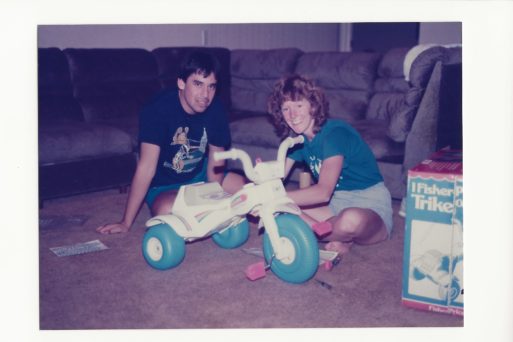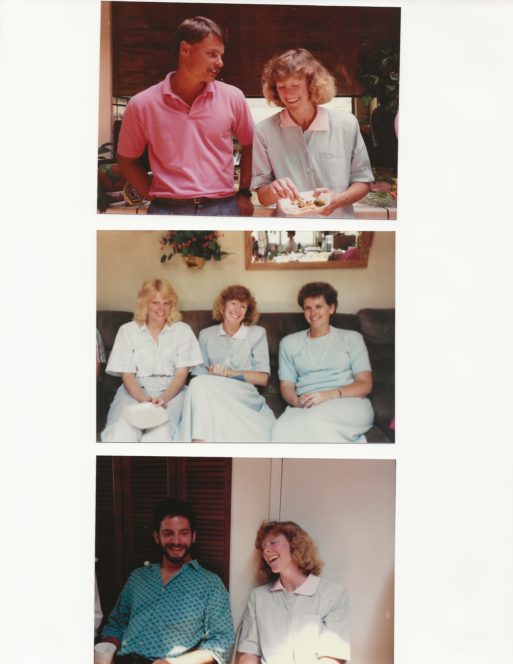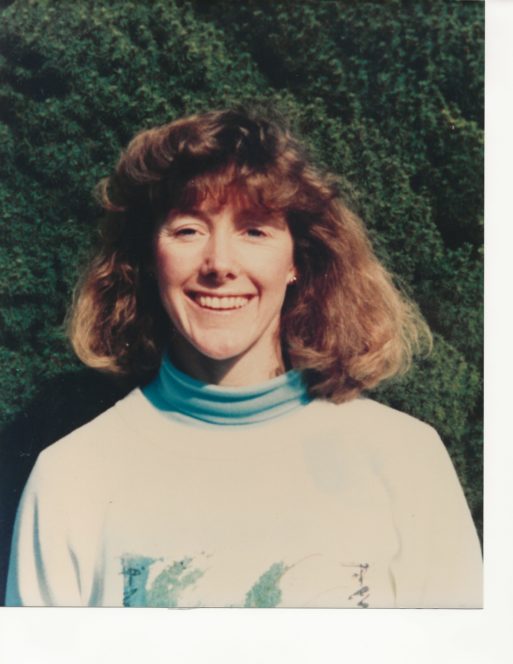This is Jeri’s story as told to Melissa Gouty. Our “Opening Our Hearts” stories are based on people’s real-life experiences. By sharing these experiences publicly, we hope to help our readers feel less alone in their grief and, ultimately, to aid them in their healing process. In this story, Jeri describes how she was devastated by her best friend’s tragic death in a car accident, and how she found comfort after tragedy in the legacy of her loving friend.
The Need for a Friend
It’s hard to understand the impact and importance of a true friend … until she’s gone.
That’s the hard, hard painful lesson I learned after the best friend I ever had died in a sudden and tragic car accident. Even more than three decades after her passing, I still feel the pain and loss.
It’s also hard to understand exactly why my friend had such an enormous impact on me unless you know a little about my background.
You see, I was one of six children, one boy and five girls. I was the second oldest. My parents viewed my older sister as “perfect,” and the third child, the boy born right after me, was born with a condition called “renal rickets.” Every few weeks he had to go to the Shriner’s Hospital for blood tests. He spent his entire second grade in the hospital, which meant that my parents focused on him.
I was from a traditional Chinese family, and we lived in the basement of my paternal grandmother who was a Buddhist priestess. The cultural expectation was that I was to do what I was told and be obedient. Between the expectation of conformity and reverence for my elders and the fact that my parents were concentrating on my younger brother, I was just “lost.”
The Problem With Being a Follower
Looking back, I understand why I became a “follower.” I wanted to be needed and accepted because I wasn’t finding affirmation at home. Whatever anybody else wanted to do, I followed along, never voicing my opinion and avoiding conflict at all costs. In fact, once a very domineering high school friend told me that a boy was cute, so I went after him. Not because I liked him or thought he was adorable, but because someone else had given me direction.
That pattern continued into my marriage. No surprise there. My husband was a teacher in a conservative Christian school, and I easily fell into the role of obedient wife. He always got his way, and I never confronted him. I might as well have been invisible.
Enter Sue
Sue came to teach second grade at the Christian school where my husband taught in Woodland, California, and that’s how we met. Sue and I connected immediately. Sue and her husband had no children yet, and Sue’s nature was to love everyone. Luckily for us, my kids were the recipients of Sue’s generous heart and constant love. She was that fun, favorite “aunt” that everyone adores.
No wonder I loved her so much.
With her training and her natural compassion, she instinctively understood my need to be listened to, affirmed and accepted for who I was. She came to love the “real” me, not the “me” I tried to be for everyone else.
Maybe she and I became such good friends because Sue naturally listened to people and supported them, especially me. She taught at the elementary school for several years, and then she went back to school to get her master’s degree in social work. It was the perfect fit for her because it so naturally fit her inclinations to help people. With her training and her natural compassion, she instinctively understood my need to be listened to, affirmed and accepted for who I was. She came to love the “real” me, not the “me” I tried to be for everyone else.
Maybe our intense connection happened because I was truly honest about my dreams and desires with her, something I had never truly done before, not even with my husband. That happened because shortly after Sue and I started doing things together and become close friends, I read a book about opening your heart to someone.
Sue was the first person I was able to do that with. Consequently, she was my first true friend.
A Lasting Regret
Because Sue was my only close friend, I was devastated when she and her husband, Tim, decided to move to Salem, Oregon, 550 miles away from us, so that he could pursue his master’s degree.

Sue putting together a Big Wheel for my kids
Yes, we talked on the phone, and I totally understood when she said, “I miss my Julie,” because I missed “my Sue.” But phone calls weren’t the same as being with her. Even though her absence loomed large in my life, and I missed her terribly, I didn’t follow through on her request that I visit her. She was probably lonely and working to settle into her new home, but I thought I had legitimate excuses to stay home. My kids were young and needed care. I was busy with church activities.
I didn’t make the time for her, even though she had always made time for me.
Not visiting her is one of the biggest regrets of my life.
The Loss of a True Friend
Sue and Tim left California in June of 1989, and they had planned a big trip to Thailand the following spring. They had only been gone nine months, but it felt like years to me. So I was absolutely thrilled when they decided that they’d come to see us before they left for Thailand.
The plan was to be with us for Easter on April 15, 1990.
I’m sure they’d been busy getting all the details of their trip together. I’m sure they had been packing and sorting and arranging and staying up late to be ready on time.
Which explains what happened. It was 2:00 a.m. when Sue fell asleep while taking her turn at driving down to see us. The car veered out of its lane and rolled across the highway and crashed, killing Sue. Tim suffered only a broken wrist.
The Easter message had told me about the joyful Resurrection that morning, but my heart was screaming that afternoon …
“Jesus rose, but Sue will not.”
Everything I had never had from my parents or my husband, Sue had given me. Acceptance. Joy. Affirmation. Friendship. And now she was gone.
The Aftermath
After her death, I sank into a deep depression. Yes, I still had kids and a family, but I couldn’t overcome my grief. I had the feeling that people just left me. That there was a huge, gaping hole in my life.
I finally decided to get some counseling, but that caused a stigma in my church because counseling wasn’t a “Christian” concept. This first counselor died, again making me feel like people were leaving me. I got a second counselor, but he was short-term because our appointments were inconsistent. Finally, I found a third counselor, stopped worrying about what other people would say, and got help.

Sue’s going away party and her constant smile
It took me two years to begin to deal with my grief. Luckily, this counselor helped me understand that my sorrow was valid. He also helped me realize that I had a codependent personality, and needed the approval of others to feel valued. He gave me methods to build my self-esteem and accept myself as I was and not because other people saw me in certain ways.
With his help, I learned to overcome my codependent tendencies. I learned to let go of the expectations of others and have a better sense of self-worth instead of depending on someone else to give that to me.
I finally learned that even without Sue to affirm me, I could stand on my own.
Love Legacy
I wish people could know how kind Sue was. How giving. How she did things for me without me asking. How she brought smiles to the faces of everyone around her.
After Sue’s death, I was able to read her journals. It’s a love legacy from her that I will always treasure. Reading about her daily activities and thoughts showed me how she cared for everyone she met. How she gave of herself without losing her own identity. How by loving others and staying true to herself, everyone came to love her.
Now, because of Sue, I understand that my self-worth is based on how much I give to others … not how much they give to me.
It was a lesson I needed to learn. Now, because of Sue, I understand that my self-worth is based on how much I give to others … not how much they give to me.
Five years after Sue died, her husband, Tim, remarried. We went to the wedding. Sue’s husband’s new wife was a widow, and she had her children pay tribute to their deceased dad during the ceremony. I was struck by the fact that there was no acknowledgment of Sue at all. And suddenly, the grief was back.
Even now, 32 years after her death, grief surprises me at times.
Telling this story still makes me choke up, decades after her death. But the flip side of that is that every time I think of her, I realize what a gift she was to me. I found comfort after tragedy because of the legacy of love and joy she left behind.
Sue’s Legacy of Love Changed My Life
It took me several years, but I eventually was able to see that I could take something out of this awful tragedy and use it for good.
Because of what I learned from Sue, I was able to become a better person.
I don’t hold back telling people that I love them or appreciate them anymore.
I don’t miss a chance to brighten someone else’s day if I can.
I’m not afraid to speak up on issues that are important to me.
I no longer worry so much about what others think of me because I don’t need their good opinion to feel good about myself.
I learned to get help through professional counseling when I needed it, a move that helped me heal and move ahead.
And I would urge all of you to know that the grief never goes away, but it can be managed. You can use those love lessons from the person you lost to become a better person. You can honor their memory by living well. You can take the time to visit the people you love. You can treasure your friends and family every day … because you never know when life will be cut short.

My best friend, Sue. I still miss her every day.

 Comfort After Tragedy: A Love Legacy From a Friend
Comfort After Tragedy: A Love Legacy From a Friend



 Final Messages of the Dying
Final Messages of the Dying
 Will I Die in Pain?
Will I Die in Pain?















